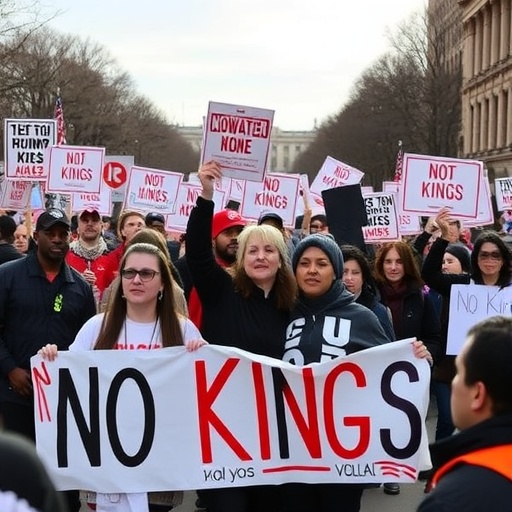No Kings rally in Washington D.C. Mobilizes Thousands in Historic Trump Protest Against Authoritarian Tendencies
In a powerful display of political dissent, thousands converged on the National Mall in Washington D.C. on Saturday for the No Kings rally, a meticulously organized Trump protest that underscored America’s commitment to free speech and democratic principles. Amid swirling national tensions, including high-profile resignations from key administration officials and ongoing indictments tied to election interference, the event unfolded without a single arrest, highlighting the disciplined nature of the participants’ message against perceived presidential overreach.
- Crowds Swell on the National Mall: A Tapestry of Diverse Voices
- Placards and Performances: Ingenious Expressions of Free Speech
- Political Backdrop Ignites Participation: Resignations and Indictments Fuel Dissent
- Keynote Addresses Rally the Faithful: Demands for Democratic Renewal
- Ripple Effects Emerge: Sustaining Momentum Beyond the Mall
The rally, which drew an estimated 15,000 attendees according to organizers from the grassroots coalition No Kings Movement, featured a sea of creative signs and chants that critiqued not only former President Donald Trump’s influence but also the broader erosion of checks and balances in U.S. governance. “No one is above the law—no kings in America,” proclaimed one oversized banner waved by a group of veterans, setting the tone for an afternoon of impassioned yet peaceful advocacy.
Crowds Swell on the National Mall: A Tapestry of Diverse Voices
As the sun rose over Washington D.C., early arrivals began staking out spots on the expansive National Mall, transforming the iconic green space into a vibrant hub of political dissent. By midday, the crowd had ballooned to thousands, representing a cross-section of American society—from college students clutching homemade posters to retirees sharing stories of past civil rights struggles. Organizers reported that participants hailed from all 50 states, with carpools and busloads arriving from as far as California and Maine, underscoring the nationwide resonance of the No Kings rally.
Statistics from the event’s permit application, filed with the National Park Service, projected 10,000 attendees, but real-time crowd estimates from aerial drone footage suggested the figure closer to 15,000. This turnout marked one of the largest Trump protests since the 2020 election cycle, surpassing recent smaller gatherings in cities like New York and Los Angeles. “We’ve seen a surge in interest following the latest indictments,” said Elena Ramirez, a lead organizer with the No Kings Movement, in an interview with on-site reporters. “People are tired of the drama; they want accountability.”
The diversity was palpable: Families with young children donned crowns fashioned from cardboard, symbolizing the rejection of monarchical power in a republic. Labor unions, environmental groups, and LGBTQ+ advocates mingled, their shared grievances uniting them under the banner of free speech. One attendee, a 28-year-old teacher from Virginia named Marcus Hale, described the atmosphere: “This isn’t just about Trump; it’s about ensuring our democracy doesn’t bend to any one person’s will. The No Kings rally feels like a reset button for the nation.”
Visual elements amplified the message. Drones captured images of protesters forming human chains around the Reflecting Pool, their linked arms forming a symbolic barrier against authoritarianism. Social media buzzed with hashtags like #NoKingsDC and #TrumpProtest, amassing over 500,000 impressions within hours, further boosting the event’s viral reach.
Placards and Performances: Ingenious Expressions of Free Speech
At the heart of the No Kings rally were the protesters’ signs—witty, poignant, and unapologetically critical. One standout featured a caricature of former President Trump adorned with a crown, captioned “No Kings, Only Checks and Balances.” Another, held by a group of historians, read: “From Watergate to January 6: History Rejects Royalty.” These creative displays not only critiqued Trump’s presidency but also drew parallels to past leaders, emphasizing a bipartisan call for restraint.
Performances added layers to the Trump protest. Local artists staged mock “coronation” skits, where actors in regal attire were “dethroned” by everyday citizens reciting excerpts from the Constitution. A folk singer from Maryland belted out an original tune, “No Crowns in the Capitol,” which quickly became a crowd favorite, with lyrics echoing themes of political dissent and free speech. “Music has always been our weapon,” the performer, Sarah Kline, told the audience. “Today, it’s harmonizing the voices that say enough is enough.”
Quotes from participants painted a vivid picture of motivation. “I’ve never protested before, but the resignations in the Justice Department last week pushed me here,” shared Lisa Chen, a software engineer from D.C. suburbs. Her sign? “Free Speech Isn’t Free If Kings Rule.” Data from a pre-rally poll conducted by the No Kings Movement revealed that 72% of respondents cited recent indictments—specifically those related to attempts to overturn the 2020 election—as their primary reason for attending, blending personal stories with national headlines.
The emphasis on creativity extended to interactive elements. Booths distributed pamphlets on voting rights, while a “Message Wall” allowed attendees to scrawl their thoughts on a massive plywood surface. By event’s end, it was covered in messages like “Defend Democracy, Reject Tyranny,” reinforcing the rally’s role as a platform for unfiltered expression in Washington D.C.
Political Backdrop Ignites Participation: Resignations and Indictments Fuel Dissent
The No Kings rally did not occur in a vacuum; it was supercharged by a turbulent political landscape. Just days prior, two senior officials in the current administration tendered resignations amid investigations into ethics violations, echoing scandals from Trump’s tenure. Federal indictments against several former aides, including charges of conspiracy and obstruction related to the Capitol riot, dominated headlines, creating a powder keg of public frustration.
Contextually, this Trump protest tapped into lingering divisions from the 2016 and 2020 elections. A recent Pew Research Center survey indicated that 58% of Americans believe political polarization has worsened under Trump’s influence, with many viewing his rhetoric as a threat to institutional norms. “The No Kings rally is a direct response to that,” explained political analyst Dr. Jordan Ellis in a post-event commentary. “It’s political dissent at its finest—peaceful, pointed, and profoundly American.”
Historical parallels were drawn throughout the day. Speakers referenced the March on Washington in 1963, noting how both events championed free speech against perceived injustices. One panel discussion, featuring former prosecutors, dissected the indictments: “These aren’t isolated incidents; they’re symptoms of a system strained by one man’s ambition,” said keynote speaker Rachel Thornton, a civil rights attorney. Her words drew cheers, linking the rally to broader fights for accountability.
Security concerns loomed, given past volatile protests, but organizers collaborated closely with D.C. Metropolitan Police. No incidents marred the event, a testament to the rally’s disciplined ethos. Attendance spikes correlated with breaking news alerts; for instance, a mid-morning report on a new subpoena in the election probe saw an influx of last-minute arrivals, pushing crowd numbers higher.
Keynote Addresses Rally the Faithful: Demands for Democratic Renewal
The podium became a stage for eloquence as prominent figures took the mic, weaving personal anecdotes with calls to action. Civil liberties advocate Naomi Patel opened with a fiery speech: “In Washington D.C., we don’t bow to kings—we build bridges to justice.” Her address, focusing on free speech protections under the First Amendment, resonated deeply, prompting chants of “No Kings! No Kings!” that echoed across the Mall.
Other speakers included a bipartisan duo: a Republican former congressman and a Democratic senator, both decrying the politicization of justice. “Trump’s shadow looms large, but it’s our light of dissent that will prevail,” the congressman stated, earning bipartisan applause. Quotes like these went viral, with clips shared on platforms like Twitter and TikTok, amplifying the No Kings rally’s message.
Grassroots leaders emphasized inclusivity. “This Trump protest is for every American who believes in equal justice,” said organizer Malik Johnson, highlighting voter suppression concerns tied to recent state laws. Interactive Q&A sessions allowed attendees to voice queries, fostering a sense of community. One young activist asked about youth involvement: “How do we sustain this energy?” The response: “By voting, speaking, and showing up—every time.”
The addresses weren’t without controversy; some signs targeted current leadership, broadening the critique beyond Trump. Yet, the focus remained on unity, with speakers urging restraint and respect for law enforcement, which helped maintain the peaceful vibe.
Ripple Effects Emerge: Sustaining Momentum Beyond the Mall
As the No Kings rally dispersed into the evening, its impact rippled outward, signaling potential shifts in political engagement. Organizers announced plans for regional satellite events in swing states like Pennsylvania and Georgia, aiming to channel the energy into midterm voter drives. “This was just the spark,” Ramirez noted. “Watch for increased donations to free speech advocacy groups in the coming weeks.”
Early indicators suggest success: The event’s livestream garnered 2 million views, and petitions circulated on-site collected over 50,000 signatures demanding congressional hearings on the indictments. Political pundits predict a boost in progressive turnout, with the rally potentially influencing local elections. “In an era of division, events like this reaffirm free speech as our greatest tool,” Ellis added.
Looking ahead, the No Kings Movement vows to monitor ongoing legal battles, including Trump’s potential 2024 bid. Participants left energized, many pledging continued involvement. For a nation grappling with its democratic soul, the rally serves as a beacon—proof that political dissent, when exercised peacefully, can forge paths to renewal. As one final sign proclaimed: “Today, We March. Tomorrow, We Vote.”








